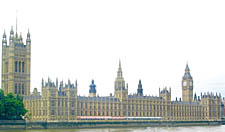|
|
 |
| |
Democracy in danger
New laws are going to hand direct rules
to ministers, warns Chris Moncrieff
THERE is a measure plodding its way through Parliament at
the moment with a title so innocuous sounding that you would
be tempted to move on, without further scrutiny, to something
more appealing. But the Legislative and Regulatory Reform Bill
is not what it seems. It sounds innocent. But it is dynamite,
and it is monstrous.
Indeed it is so explosive in its content that it is seen
as seriously undermining and damaging our unwritten constitution.
It has been dubbed by opponents as the Abolition of Parliament
Bill. It could enable the government virtually to ignore the
House of Commons altogether.
Do not allow yourself to be lulled into complacency by the honeyed-words
of Labour ministers and their spin-doctors. They will try to
tell you that it is merely a measure of convenience enabling
the government of the day to cut parliamentary red tape quickly
and to ensure that our laws are compatible with human rights
legislation.
With the Legislative and Regulatory Reform Bill, ministers are
trying to lull us all into complacency, saying we are getting
worked up for no reason whatsoever. But listen to the words
of Kenneth Clarke, the former Tory Chancellor, and a man not
given to exaggeration: “They have produced a Bill which
could be used to sweep away Parliamentary procedure and debate
on an astonishing scale.”
The Bill, if it becomes law, will reduce Parliament to a mere
voting machine, or something even worse, a rubber-stamping machine.
It will enable measures to go through without a syllable of
debate, permitting sweeping and widespread legal changes without
so much as a single word uttered in the House of Commons. And
worst of all, it could allow a government to remain in power
for years on end, thus avoiding the inconvenience of a general
election to keep them in office or to boot them out.
These are massive issues, on a scale that Parliament has not
seen before. But we are being told that we are getting hysterical
about something which is as harmless as a spring lamb. Calm
down! they implore us. Don’t worry!
These draconian powers will not be invoked, they assure us,
on controversial issues. Well, you can take that with a pinch
of salt. Who is to define what is controversial and what is
not? If this government is regarded as benign, and will stick
to its word – an arguable statement in itself – what
about its successors, who might be tyrannical?
Are they going to feel bound to adhere to these assurances?
Of course they will not. But more immediately to the point,
can we even trust the present government to keep its word? I
am afraid to say that it would be a foolish man who answered
“yes” to that question.
The spin and sheer deceit of politicians over the last decade
or so should have made us all sceptical of the worth of their
soothing words and glib promises. For once the Tories and the
Liberal Democrats are at one in their disquiet about this measure.
For the Liberal Democrats, David Heath has complained about
the “laxity” of definition of the terms used in the
Bill. He said: “The provisions give an astonishing degree
of power to the Minister of the day.” And he makes the
point that future ministers may not be so engaging or benign
as the present bunch. Parliament is already under assault from
the European Union whose torrents of directives and regulations
are, in the eyes of Eurosceptics, reducing Westminster to the
status of a county council.
Jim Murphy, the Parliamentary Under-Secretary of State for the
Cabinet Office, who is helping to pilot this measure along its
bumpy passage through Parliament, says that the Bill “is
not intended to reflect far-reaching constitutional changes.”
Don’t you believe a word of it.
|
| |
|
 |
|


